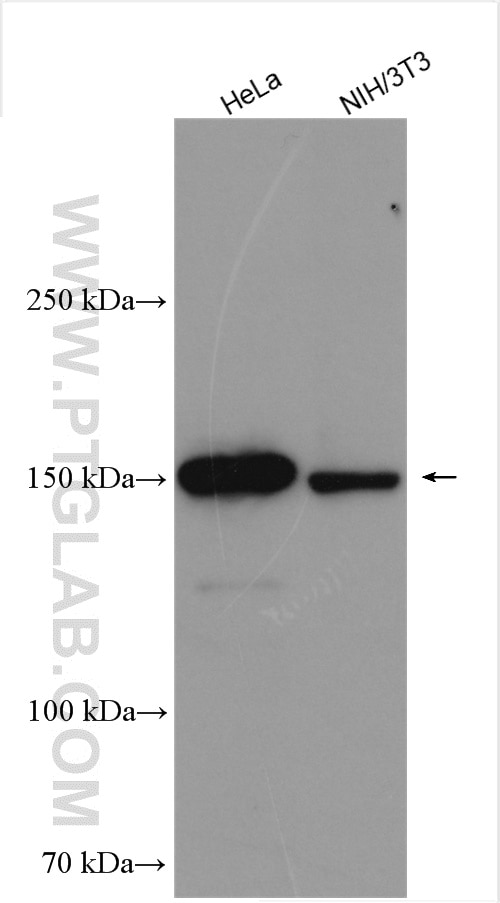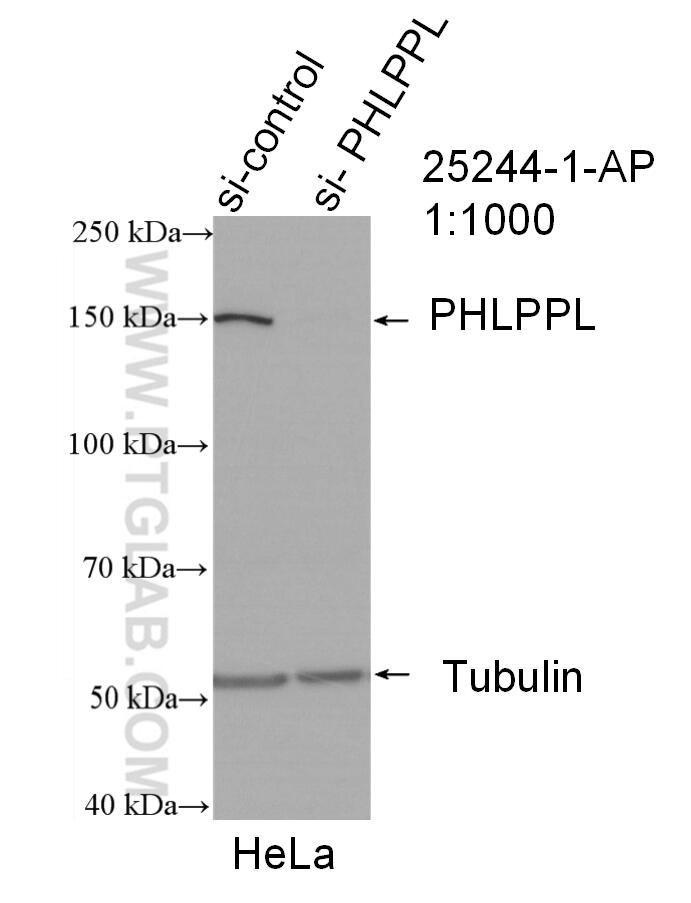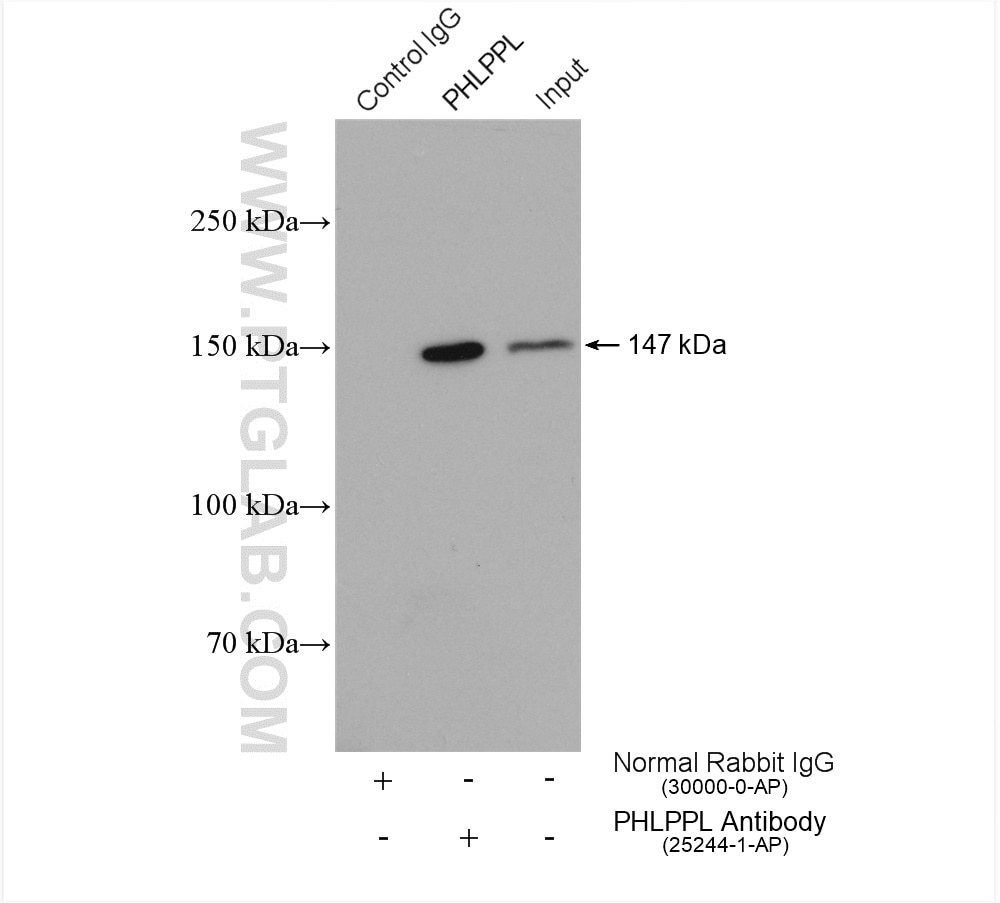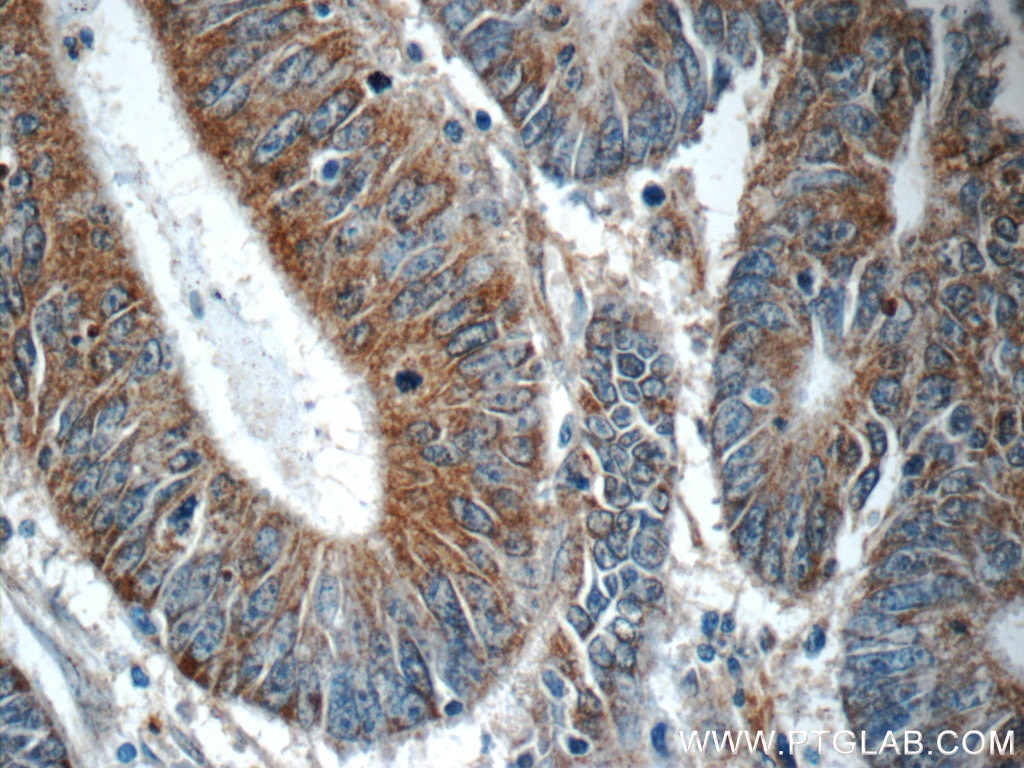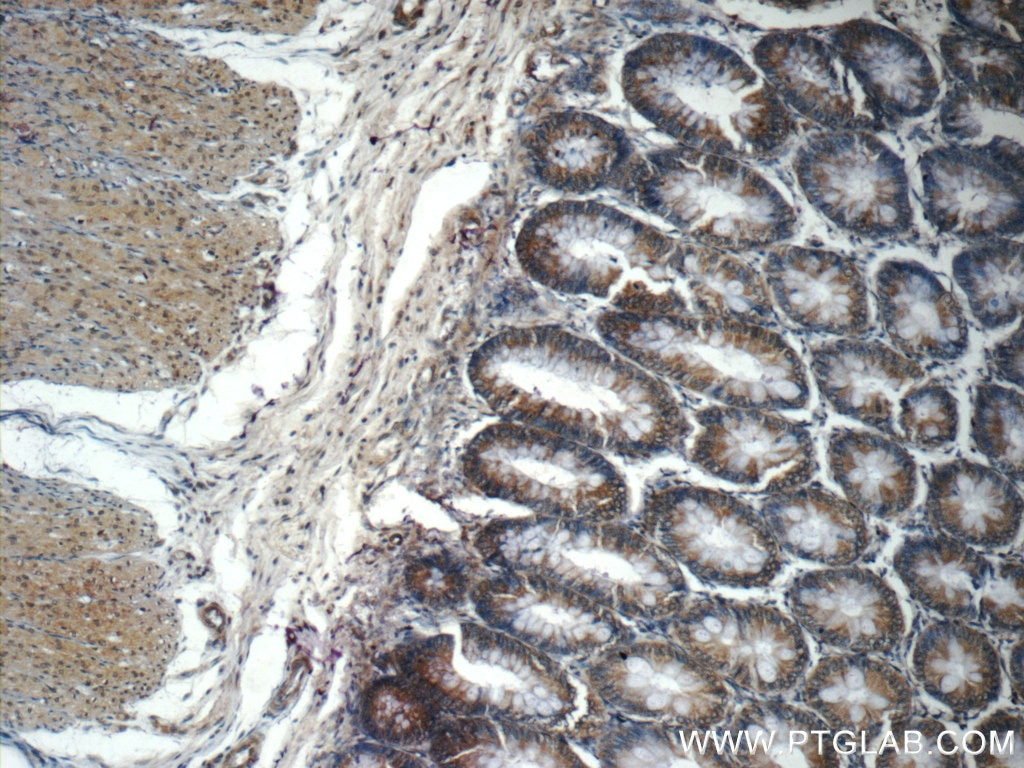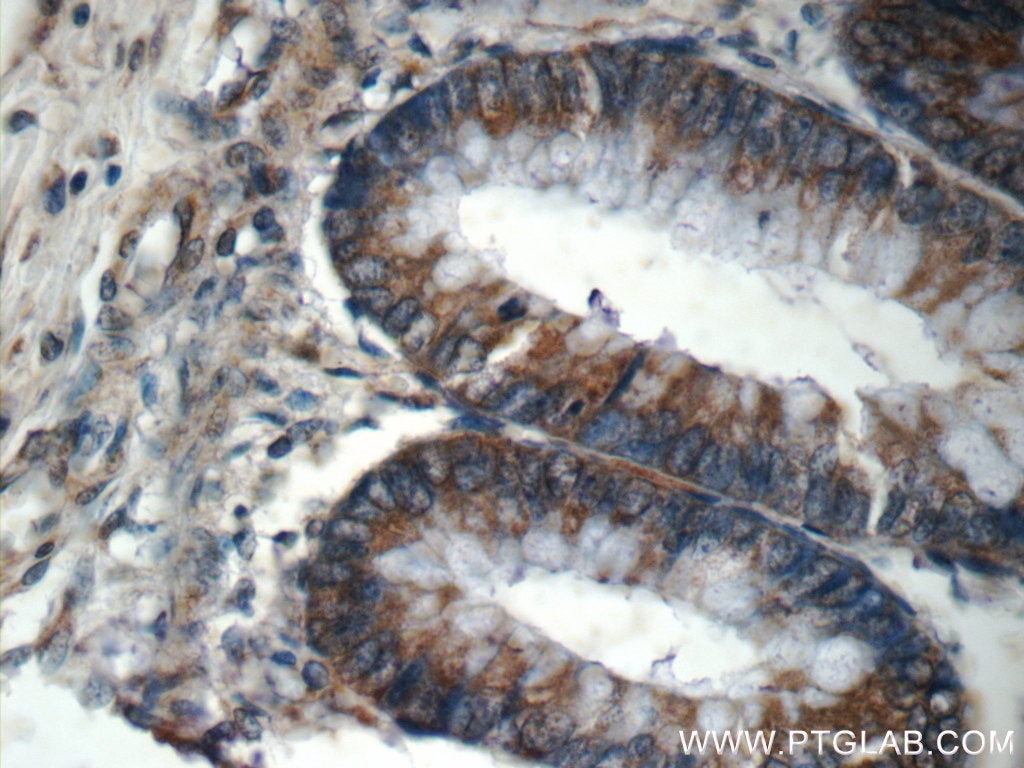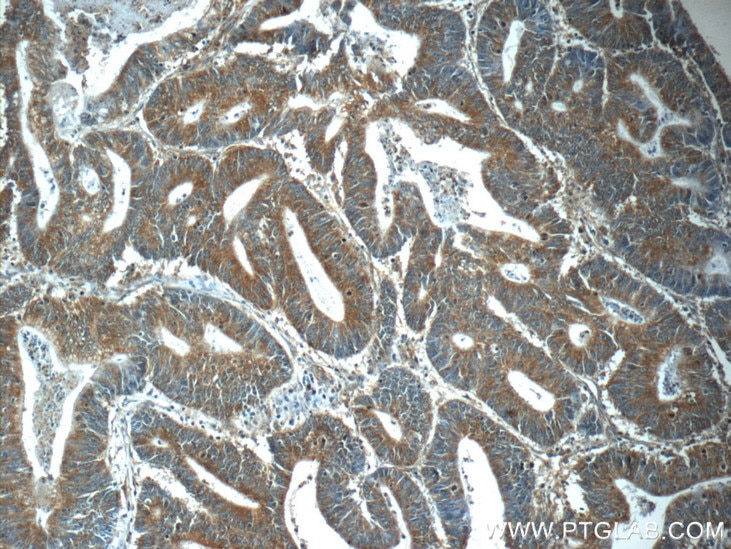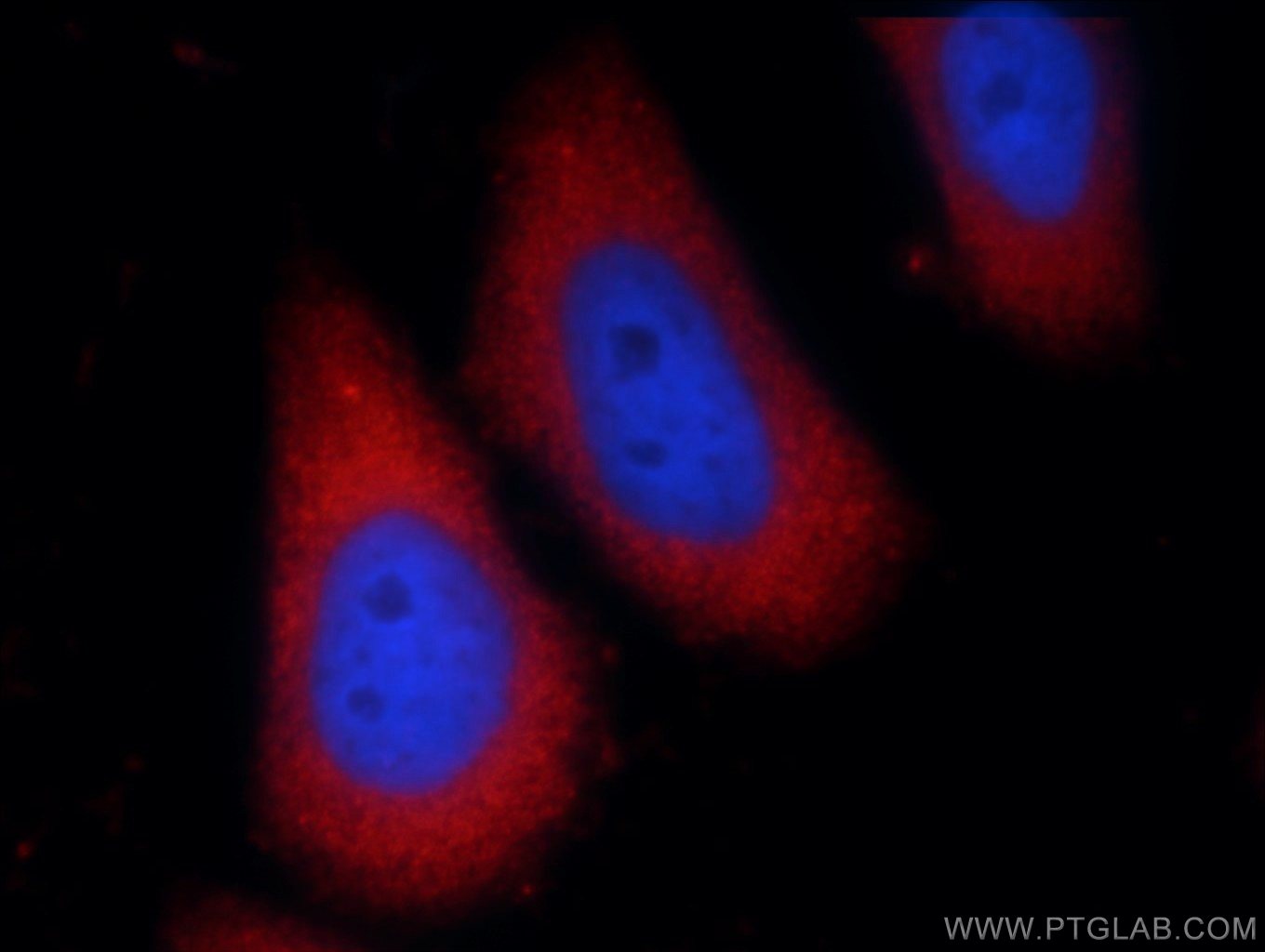- Phare
- Validé par KD/KO
Anticorps Polyclonal de lapin anti-PHLPP2
PHLPP2 Polyclonal Antibody for WB, IHC, IF/ICC, IP, ELISA
Hôte / Isotype
Lapin / IgG
Réactivité testée
Humain, rat, souris et plus (1)
Applications
WB, IHC, IF/ICC, IP, ELISA
Conjugaison
Non conjugué
N° de cat : 25244-1-AP
Synonymes
Galerie de données de validation
Applications testées
| Résultats positifs en WB | cellules HeLa, cellules NIH/3T3 |
| Résultats positifs en IP | cellules HeLa, |
| Résultats positifs en IHC | tissu de cancer du côlon humain, tissu de côlon humain il est suggéré de démasquer l'antigène avec un tampon de TE buffer pH 9.0; (*) À défaut, 'le démasquage de l'antigène peut être 'effectué avec un tampon citrate pH 6,0. |
| Résultats positifs en IF/ICC | cellules HeLa |
Dilution recommandée
| Application | Dilution |
|---|---|
| Western Blot (WB) | WB : 1:500-1:2000 |
| Immunoprécipitation (IP) | IP : 0.5-4.0 ug for 1.0-3.0 mg of total protein lysate |
| Immunohistochimie (IHC) | IHC : 1:20-1:200 |
| Immunofluorescence (IF)/ICC | IF/ICC : 1:10-1:100 |
| It is recommended that this reagent should be titrated in each testing system to obtain optimal results. | |
| Sample-dependent, check data in validation data gallery | |
Applications publiées
| KD/KO | See 3 publications below |
| WB | See 15 publications below |
| IHC | See 5 publications below |
| IF | See 2 publications below |
Informations sur le produit
25244-1-AP cible PHLPP2 dans les applications de WB, IHC, IF/ICC, IP, ELISA et montre une réactivité avec des échantillons Humain, rat, souris
| Réactivité | Humain, rat, souris |
| Réactivité citée | rat, Humain, poisson-zèbre, souris |
| Hôte / Isotype | Lapin / IgG |
| Clonalité | Polyclonal |
| Type | Anticorps |
| Immunogène | PHLPP2 Protéine recombinante Ag19000 |
| Nom complet | PH domain and leucine rich repeat protein phosphatase-like |
| Masse moléculaire calculée | 1323 aa, 147 kDa |
| Poids moléculaire observé | 147 kDa |
| Numéro d’acquisition GenBank | BC129927 |
| Symbole du gène | PHLPPL |
| Identification du gène (NCBI) | 23035 |
| Conjugaison | Non conjugué |
| Forme | Liquide |
| Méthode de purification | Purification par affinité contre l'antigène |
| Tampon de stockage | PBS with 0.02% sodium azide and 50% glycerol |
| Conditions de stockage | Stocker à -20°C. Stable pendant un an après l'expédition. L'aliquotage n'est pas nécessaire pour le stockage à -20oC Les 20ul contiennent 0,1% de BSA. |
Informations générales
PHLPP2 also named as PHLPPL is a 1323 amino acid protein, which contains 22 LRR repeats, 1 PH domain and 1 PP2C-like domain. Localized to both the nucleus and the cytoplasm, PHLPPL uses manganese as a cofactor and mediates the dephosphorylation of Akt1, thereby playing a role in cell survival and apoptotic regulation. Multiple isoforms of PHLPPL exist due to alternative splicing events.
Protocole
| Product Specific Protocols | |
|---|---|
| WB protocol for PHLPP2 antibody 25244-1-AP | Download protocol |
| IHC protocol for PHLPP2 antibody 25244-1-AP | Download protocol |
| IF protocol for PHLPP2 antibody 25244-1-AP | Download protocol |
| IP protocol for PHLPP2 antibody 25244-1-AP | Download protocol |
| Standard Protocols | |
|---|---|
| Click here to view our Standard Protocols |
Publications
| Species | Application | Title |
|---|---|---|
Oxid Med Cell Longev Colonic Epithelial PHLPP2 Deficiency Promotes Colonic Epithelial Pyroptosis by Activating the NF-κB Signaling Pathway.
| ||
Mol Ther Nucleic Acids Tumor-Derived EV-Encapsulated miR-181b-5p Induces Angiogenesis to Foster Tumorigenesis and Metastasis of ESCC. | ||
Oncotarget PHLPP negatively regulates cell motility through inhibition of Akt activity and integrin expression in pancreatic cancer cells.
| ||
Oncotarget High PHLPP1 expression levels predicts longer time of acquired resistance to EGFR tyrosine kinase inhibitors in patients with lung adenocarcinoma. | ||
FASEB J Role of epigenetic m6 A RNA methylation in vascular development: mettl3 regulates vascular development through PHLPP2/mTOR-AKT signaling. | ||
Front Oncol Reduced PHLPP Expression Leads to EGFR-TKI Resistance in Lung Cancer by Activating PI3K-AKT and MAPK-ERK Dual Signaling. |
Avis
The reviews below have been submitted by verified Proteintech customers who received an incentive for providing their feedback.
FH Slavica (Verified Customer) (10-04-2021) | The antibody worked very well!
|
